A Chance for Citizens to Contribute
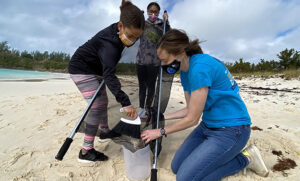
Cousins Dennilyn Outerbridge-Zuill (left) and Zaynah Durham (center) teamed up with BIOS intern and event mentor Susie Hill on February 7th as volunteers with a BIOS-sponsored marine microplastics collection event, part of a larger, ongoing project to learn more about debris on Bermuda’s beaches. The girls, who helped fellow volunteers sieve 2,800 gallons (10,800 liters) of sand, also earned community service credit required by Clearwater Middle School.
Bermudian Tiana Outerbridge first learned about marine plastics washing up on coastal shores and harming marine life from a Netflix documentary, which she said left her “totally dismayed” and feeling like “we must make a better effort of taking care of the earth.” She found that opportunity this month, when BIOS educators offered local residents a chance to pitch in and learn more about ocean microplastics, pulverized plastic pieces smaller than cupcake sprinkles. As a pollutant, these accumulated bits can harm aquatic life and, potentially, human health.
Outerbridge, a 41-year-old registered nurse, joined the BIOS-sponsored microplastics collection effort on February 7th with her two teenage daughters and an 11-year-old niece, along with seven other volunteers. Their work, sifting beach debris as part of a larger, ongoing plastics study on Bermuda’s beaches, earned each participant the title of “citizen scientist.”
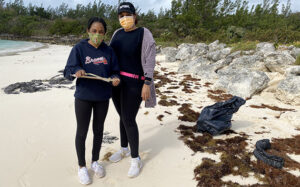
Registered nurse Tiana Outerbridge (right) and her daughter Zhuri Durham, a Cedarbridge Academy student, became “citizen scientists” through their volunteer work at BIOS. Outerbridge became aware of the marine debris issue after watching a documentary and wanted to involve her family to learn more. “The girls were surprised at the amount of trash that has washed upon our shores as well as the size and amount of microplastics in the sand,” Outerbridge said.
As a winter wind blew that hazy Sunday morning at Cooper’s Island Nature Reserve, the gathered volunteers and their BIOS mentors divided into smaller teams to sift debris from four tidal points at Well Bay and Long Bay beaches. After an hour of shaking sand through sieves, volunteers swept the accumulated bits of confetti-like green, blue, orange, and white microplastics into a container, then carefully poured the contents into clear bags.
While sieving, volunteer Claire Fox said “it was heartbreaking to see how much of the sand was actually tiny pieces of plastic. But it was also an inspiring experience because understanding the impact is a critical step in tackling the microplastics problem.”
In total, the volunteers sieved a total of 2,800 gallons (10,800 liters) of sand. Afterward, the bagged debris was brought back to the lab at BIOS, where it will be dried, sorted, and categorized by size. Event coordinator and BIOS director of education and community engagement Kaitlin Noyes said that collections like these will be conducted monthly by citizen science volunteers, as well as local students, at the two beach locations. After a year, results will be tallied and shared with the Bermuda Marine Debris Taskforce.
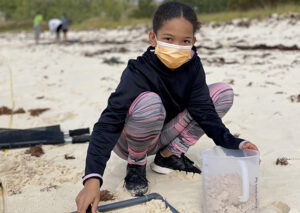
Citizen scientist and Clearwater Middle School student Dennilyn Outerbridge-Zuill learned that microplastics come from a variety of sources, including from larger plastic debris that degrades into smaller pieces. In addition, microbeads, a type of microplastic, are tiny pieces of manufactured polyethylene plastic that are added as exfoliants to health and beauty products.
During the beach collection, curious walkers and cyclists stopped to ask Noyes questions. She explained how the seemingly harmless multicolored bits of plastics, which take hundreds or thousands of years to decompose, can be mistaken for food by marine life. Their chemical components also may make their way into the food chain and become ingested by people.
Microplastics come from a variety of sources, including larger plastic debris ranging from fishing nets to water bottles that degrade into smaller pieces. In addition, microbeads, a type of microplastic, are tiny pieces of manufactured polyethylene plastic that are often added as exfoliants to health and beauty products, such as cleansers and toothpastes.
Global estimates of microplastics indicate that nine to 15 million tons of microplastics, fragments measuring between five millimeters and one micrometer, are embedded in the seafloor alone (not counting more buoyant pieces found on the ocean’s surface and along coastlines, such as in Bermuda).
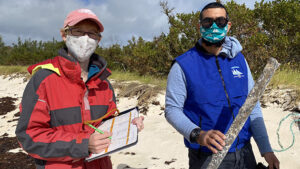
Claire and Mark Fox, who attended with Mark’s mother, Susan Fox, volunteer for various non-profit organizations in Bermuda, including BIOS. During the event on Feb. 7th, they collected larger pieces of debris found on beaches, which they recorded in the Marine Debris Tracker app. Residents who wish to participate in the debris collection and identification may download the app on their phones to directly contribute to ongoing research at BIOS.
Volunteers at this month’s event ranged from middle school students to retirees. Claire Fox, a past participant of several BIOS educational programs for older teens and young adults, joined with her husband and mother-in-law. “My background is in marine science, so I have an understanding of how time-consuming data collection can be, especially for scientists working with a small team,” she said.
For Fox, it was an opportunity to learn more about the methods used to quantify marine debris, particularly microplastics. “I think that it can be easy to ignore the microplastics on our beaches and discount the impact that they have on the environment until you stop to take a closer look,” she said.
Fellow volunteer Caroline Alexander, a BIOS Bermuda Program alumnus completing her dissertation on Bermuda’s microplastics through remote studies at the University of Bristol in the U.K., showed her mother, a yoga instructor, the proper protocols for collecting microplastics.
“She was surprised by how much of a workout it is to sieve the sand for microplastics,” Alexander said. “She never liked science in school but feels strongly about pollution and littering in Bermuda and she doesn’t shy away from a trash pick-up. I think she enjoyed the experience as it was something different and fun to do.”
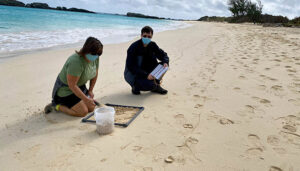
Volunteer Pam Amaral (left), a BIOS development officer, and BIOS intern and event mentor Shane Antonition collected sand that they sieved for marine microplastics. “I’m personally driven by the threat posed by microplastic pollution,” Antonition said. “There is an urgent need to study the scale of microplastic pollution, in addition to its potential impacts, so we can inform effective solutions to combat it.”
Picking out plastics from sand, and making sense of it, is trickier than it seems. Last summer Noyes and a team of BIOS interns developed a detailed collection protocol that allows data about microplastics to be consistently compiled and compared across Bermuda’s beaches. This standardized data stream builds a record of accumulation of microplastics in Bermuda over longer time scales, providing a snapshot of how much microplastic has, and continues to be, deposited on the island’s beaches.
One team member, Shane Antonition, a BIOS Ocean Academy intern and a mentor at the event, said he saw the volunteer opportunity as another chance to refine the sampling methodology for monitoring beach debris. He streamlined operations and helped ensure a high degree of confidence in the data collected by citizen scientists by restricting the collection to designated tide lines, in addition to taking photographs and GPS points. He will also help oversee the continued categorizing and data collection back at the BIOS laboratory.
He said he was “thoroughly impressed with how effective the members of the public were with following the methodology. I saw no issues and we got the beaches sampled in fantastic time.”
Outerbridge, whose initial introduction to the marine debris problem through Netflix proved so alarming, said she felt buoyed and informed after participating as a citizen scientist. “We found something to do as a family that makes a difference in our world,” she said.
Locals interested in joining the BIOS mailing list to receive updates on future citizen science events may register at oa@bios.edu
